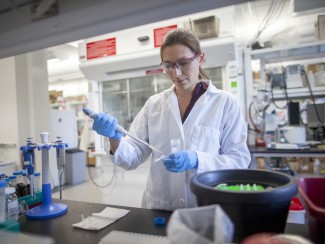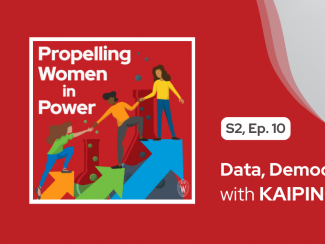
Media coverage of WEI this month focused on the changing energy and water infrastructure, a diversity of climate conversations, and the feasibility of climate action plans.
Inside Clean Energy: What Happens When Solar Power Gets Much, Much Cheaper?

Inside Climate News
The plummeting price of electricity from solar panels is one of the driving forces aiding the transition to clean energy.
The Department of Energy is aiming to cut the price of utility-scale solar by more than half by 2030. Greg Nemet, a University of Wisconsin public affairs professor chimes in on how achievable this goal is.
Featured Researchers
Solar Battery Infrastructure, Research Increasing in Wisconsin

Spectrum News 1
So far this year We Energies has announced two massive solar projects, one with 200 megawatts (MW) of solar generation in Kenosha County and the other with 250 MW in Rock and Walworth Counties. It's enough to power 60 and 75 thousand homes respectively. The projects also feature solar battery storage capacity.
Song Jin, a UW-Madison chemistry professor who researches solar power and solar battery technology, was happy to hear about the projects.
Featured Researchers
The Midwest’s Active Fire Season Is a Warning

Earther
It’s a climate cliché to say the world is on fire, but it is. Right now, wildfires are burning across the Midwest in a major spring burn. The spring flames there are a warning sign of what could be an active fire season out in the coming months.
Dan Vimont, director of the Nelson Institute Center for Climactic Research at UW–Madison, said that while climate change clearly played a huge role in sparking recent devastating wildfires in California and Australia, the same can’t be said about the Wisconsin wildfires.
Featured Researchers
As rainstorms grow more severe and frequent, communities fail to prepare for risks

Washington Post
When then-Wisconsin Gov. Scott Walker (R) announced plans in 2017 for a sprawling Foxconn electronics plant, he touted the 13,000 promised jobs and $10 billion investment spread across 1,000 acres, much of it farmland. Downstream across the border in Lake County, Ill., officials focused on a more sinister byproduct: water.
Featured Researchers
Recycling Plastics And Other Important Materials Needs Some Real Help

Forbes
Ever since Dustin Hoffman heard the word “Plastics” in 1967, these materials have blossomed into every aspect of modern life. I cannot find an area of life where plastics are not ubiquitous. According to the EPA, each year America generates over 35 million tons of plastics. Over 70 billion tons worldwide.
But we just aren’t recycling enough of it to address the resulting pollution or climate change or just our need to stop the astronomical piles of garbage that are growing worldwide.
Featured Researchers
Environmental justice approaches paramount in combatting climate change, panel says

The Badger Herald
To create an equitable future while combatting climate change, policymakers must dismantle disparities and empower underrepresented voices, experts said in a Wisconsin Institute for Discovery panel on Tuesday night.
The virtual event was this year’s final talk for the WID “Crossroads of Ideas” series, which features monthly lectures during the academic year.
'We Need To Act Now': This Small Wisconsin City Is Boosting Its Use Of Renewable Energy To Fight Climate Change

WPR
As the country marks Earth Day on Thursday, President Joe Biden is announcing a new climate goal to reduce emissions and reverse Trump administration policies. In Wisconsin, Gov. Tony Evers has set a goal for the state to go carbon-neutral by 2050 — a benchmark scientists warn needs to be met to prevent the worst effects of climate change, even if it's a challenging one.
Featured Researchers
Could the World Ever Run Entirely on Renewable Energy?

Earther
This week’s question—could the world ever run entirely on renewable energy?—is shadowed by a much larger one: Namely, will politicians and powerful forces of delay like Big Oil ever allow the world to run entirely on renewable energy? For the most part, we have put that larger question aside for this installment; the experts below are interested primarily in whether it’s feasible.
Featured Researchers
Enzyme from fungus could help produce renewable fuels and chemicals

Innovation News Network
Researchers at the University of York have discovered an enzyme in a fungus that could provide a breakthrough in the upscaling of renewable fuels and chemicals.
The enzyme releases a valuable chemical from agricultural waste and can thus act as a catalyst to the biochemical reaction that breaks down lignocellulose, which could potentially be used as a sustainable resource to produce renewable fuels and chemicals.
Featured Researchers




